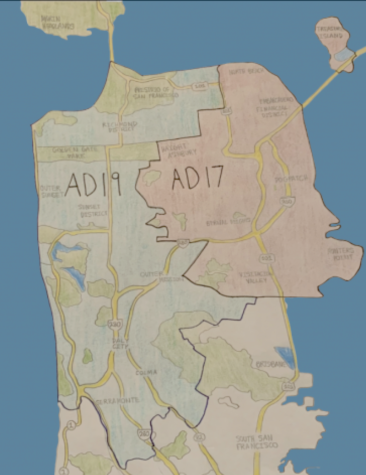The race for District 17’s next Assembly Member

California State Assembly Districts 19 and 17. Illustration credit: Delancy Gaito.
On February 15, citizens of District 17 voted in a primary election to send two of the four Assembly seat candidates, current Board of Supervisors member Matt Haney and former Board of Supervisors member David Campos, to a runoff election on April 19. The District 17 slot opened up when David Chiu, the former District 17 assembly person, became the city attorney.
District 17 is located on the eastern side of San Francisco stretching past Hunters Point down to North Beach, and includes neighborhoods such as the Haight, Twin Peaks and the Financial District.
California has 80 Assembly districts, each with one representative. Assembly members are re-elected every two years and can serve a maximum of 12 years. They introduce and vote on legislation at the state-level on topics such as housing, public safety, climate change, education and transportation. Sid Dufty ‘24, who lives in District 17, sees housing issues as one of the district’s biggest challenges. “There’s a lot of houselessness and though there are good resources for shelters and housing, there are also a lot of flaws in that system,” Dufty said. CBS SF Bay Area reports that along with houselesness, District 17’s largest issues are drug abuse and an absence of affordable housing.
Both Haney and Campos believe that they can help these issues through supporting people’s economic situations. According to the Campos campaign website, he wants to help California residents live affordable lives and create an “economy that works for everyone.” He is a proponent of raising the minimum wage, Medicare for All and creating job opportunities for people by “adopting the Green New Deal.” Campos is taking a break from his role as District Attorney of San Francisco Chesa Boudin’s Chief of Staff to run his campaign.
Similarly, Haney wants to ensure that all California jobs guarantee a living wage, along with affordable health care and retirement benefits. Haney also wants to adopt a Green New Deal that creates new jobs and supports environmental justice. Both Campos and Haney support massively expanding supportive housing along with addressing root causes of houslessness by creating, for example, more job training and mental health support.
While the two candidates agree on most things, their slight difference in degree of progressiveness is evident in their differing opinions on a proposal for a 495-unit high-rise apartment complex in the South of Market neighborhood. Haney, as a current Board member, voted for the proposal because he believed that it would provide much needed housing to cut the city’s shortage of affordable units. Campos, who leans further to the left, says if he was still on the Board of Supervisors he would have rejected the proposal because he fears it would increase the cost of living and displace lower income residents.
Nico Dezerega ‘22 who lives in District 17 acknowledges the challenge of increasing housing options and minimizing gentrification. “[I want to see my representative] working on affordable housing and trying to put a stop to gentrification,” said Dezerega.
In addition, the candidates’ campaigns have different corporate donation policies. According to the San Francisco Chronicle, Haney raised $803,700 as of February 16, whereas Campos raised $554,500. Campos says his lower numbers come from the fact that he was the only candidate who did not accept corporate donations and didn’t give-in to corporate interests. However, The Chronicle reports that he has picked up some notable donations from people who work in the corporate sphere. Campos attributes Haney’s 1.9% lead in the February 15th primary to his campaign’s acceptance of corporate funds.
In an interview with The SF Minute, Campos said he feels obligated to run even after his close assembly loss in 2014. “I think that the combination of having representation from the Queer community, the LGBTQ community, the Latino community, I think that it created in me a sense of responsibility that I have to do it,” he said. He also believes that as the most politically experienced candidate, he will be the most effective and garner the greatest political support across parties.
On the other hand, Haney said he wants to continue his Board of Supervisor work at the state level during his interview with The SF Minute. Describing his time as a legislative aid in Sacramento, he said, “I was like, ‘Wow……[State Legislators] really decide what happens in schools and colleges and criminal justice and health care’…Sacramento is actually where so many of the important decisions are being made.”

